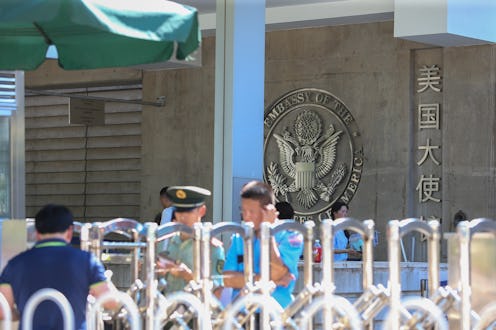News
There Was An Explosion Outside The US Embassy In China — Here’s What To Know

A 26-year-old man reportedly set off a small explosion near the U.S. Embassy in Beijing on Thursday, injuring only himself. According to CNN, authorities detained the suspect soon after the explosion and took him to a hospital for non-life threatening injuries, but his motive has not yet been confirmed.
Beijing police described the small explosive device as a "firecracker," while the U.S. Embassy called it a "bomb" in a statement about the explosion. Police identified the suspect as a man whose last name is Jiang, and said he was from the Chinese region of Inner Mongolia. The New York Times reported that the explosion took place around 1 p.m. local time and could be heard from several blocks away.
“Other than the bomber, no other people were injured and there was no damage to embassy property,” the embassy subsequently said in a security notice.
The explosion took place near the southeast corner of the embassy compound. A visa agent at the embassy, who was nearby when the suspect detonated the explosive, told The New York Times that the explosion had been caused by a man who was trying to raise awareness about a human rights issue. The explosion is still under investigation, however, and Chinese Ministry of Foreign Affairs spokesman Geng Shuang described it as an "isolated security incident" in his daily press conference, according to CNN.
According to CNN, the U.S. Embassy in Beijing opened in 2008 and is one of the most secure embassies in the world. However, the area in which the suspect detonated his explosive device is also home to other embassies. The Japanese, South Korean, and Indian embassies are all nearby, among others, though India’s ambassador to China — Gautam Bambawle — reportedly described the explosion as a low-intensity blast.
Videos of the explosion and its aftermath that circulated on social media appeared to show smoke rising close to where people typically line up for visa appointments at the embassy. Reuters reported that although there were no injuries to anyone except the suspect, a police SUV seemed to have been damaged, and it was removed from the scene after being cordoned off.
The smoke cleared quickly after the explosion, witnesses told Reuters, and the embassy reportedly resumed its regular operations at 1:45 p.m. local time. By 3 p.m., Bloomberg reported that those with visa appointments were once again waiting in line near the site of the explosion.
According to the BBC, the explosion was not the only incident that took place outside the embassy on Thursday. Earlier in the day, a woman reportedly tried to set herself on fire after spraying herself with gasoline before being taken away by authorities. The Chinese state-run Global Times subsequently reported that there was no proof that the suspected self-immolation attempt was related to the explosion that followed in the afternoon.
Thursday's explosion outside the U.S. Embassy occurred amidst escalating tensions between the U.S. and China. Between Donald Trump's trade war and increased military ties to Taiwan, the two countries have recently been at odds on multiple issues.
If the suspect was trying to bring attention to a human rights issue — though this has not been confirmed — it would not be the first time that dissidents took such measures. According to The Times, many people who petition the Chinese government over their grievances don't feel as though they have received justice, and often turn to other avenues as a result. In 2013, for example, a man who had been paralyzed after reportedly receiving a severe beating from local authorities detonated a bomb at Beijing's international airport in 2013, injuring only himself.